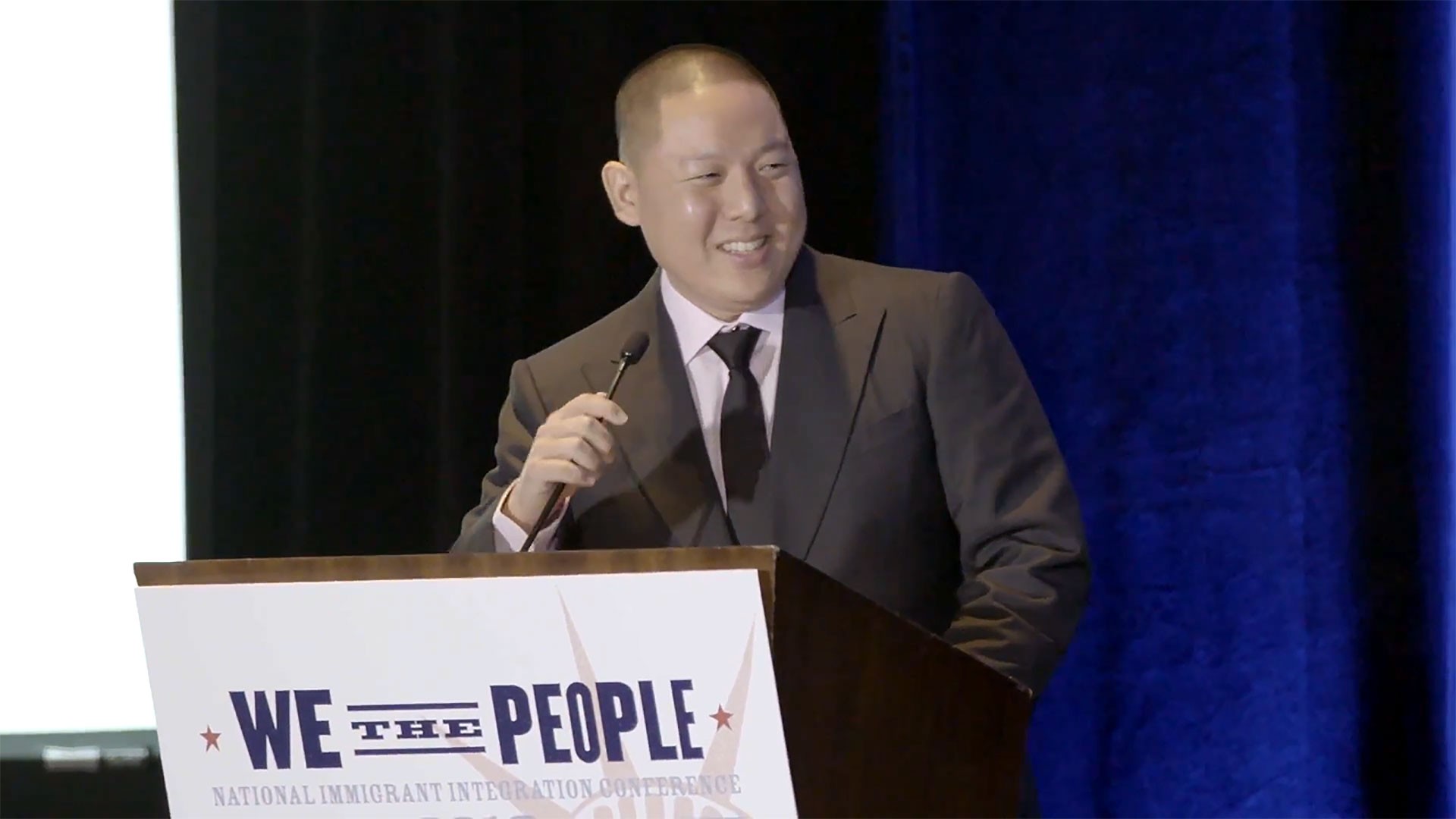Though Noe, an undocumented dairy farmer in West Texas, has qualified for a green card since he married a US citizen 11 years ago, he never applied—status as a legal resident would have been nice but didn't seem like it would be worth the expense. That changed last week, after he heard immigration agents were raiding ranches in his town. Petrified, Noe went into hiding while his wife Margarita traversed the state to file Noe's application with an attorney."We'd thought about applying before, but we didn't have the money… now it's urgent," Margarita, 38, told me on the phone from Fort Worth, where she'd gone to meet her immigration lawyer. (I'm omitting the couple's last name because Noe is still vulnerable to enforcement.) "Now that things are getting worse it's a time to step up and take care of what needs to be taken care of."Threatened with the prospect of deportation under the Trump administration, undocumented spouses of US citizens have recently rushed to begin applying for green cards and provisional visa waivers, which pardon them for living in the US illegally. The immigration attorneys I spoke with say they've helped clients file at least twice the typical number of applications since late January, when President Donald Trump issued his executive order making all undocumented immigrants priorities for deportation."A lot of individuals who were somewhat apprehensive about the process are now signing up to move forward in a legal fashion," Fort Worth immigration attorney Jason Mills, who is handling the couple's case, told me. "I've seen an increase of at least twofold and probably more than that. It used to be that out of every ten clients who visited my office [for green cards], two or three would apply. Now it's more like eight or nine out of ten."While all spouses of US citizens are eligible for green cards, those who have lived illegally in the country must also obtain an unlawful presence waiver. Before this year, undocumented spouses often avoided the complex waiver process since they figured they weren't at risk of deportation. But under Trump's sweeping immigration crackdown, many undocumented spouses are suddenly viewing the waiver as the only way to remain with their families.Watch Eddie Huang's speech about the immigrant experience in America:  Applying for the waiver and green card is a lengthy, expensive process that costs a few thousand dollars and takes up to two years. First the citizen spouse files a visa petition to US Citizenship and Immigration Services asking that his or her partner be considered for a visa on the grounds of their marriage. Once that is approved, the couple applies for the waiver, which requires the citizen to prove that he or she would suffer extreme hardship without his or her spouse in the country. The hardship must be specific and concrete, such as financial instability, an inability to support US citizen children, or medical issues that require the partner's care."The risk is there is about a 25 percent denial rate for waivers," Doug Stump, an immigration lawyer in Oklahoma City and former president of the American Immigration Lawyers Association, told me. "The reason you'd get a waiver denied is generally if you have not adequately demonstrated that the [spouse] will experience the level of hardship necessary for approval."The waiver is also automatically denied if the undocumented spouse has a criminal record or has left and illegally reentered the country and has spent at least one year without papers in the US, Stump explained. Without the waiver, an undocumented spouse must leave the US for ten years before applying for a green card.The process was trickier before 2013, when the Obama administration created a provisional unlawful presence waiver, allowing undocumented spouses to apply for status while remaining in the US. Before then, they would have to return to their home countries in order to apply for the waiver. They'd wait about nine months outside the US for a response, said Stump—and if they were denied they couldn't return. Even after the Obama reform, spouses must return to their home countries for a meeting at the US consulate to be approved as a legal US resident."Before people were daunted by the concept of having to leave the country and come back in as the final step and maybe felt somewhat secure and not as rushed to obtain legal status," said Lincoln-Goldfinch. "But when Trump took office people all of the sudden felt very afraid and felt the risk of consular processing was less than staying in the US undocumented."
Applying for the waiver and green card is a lengthy, expensive process that costs a few thousand dollars and takes up to two years. First the citizen spouse files a visa petition to US Citizenship and Immigration Services asking that his or her partner be considered for a visa on the grounds of their marriage. Once that is approved, the couple applies for the waiver, which requires the citizen to prove that he or she would suffer extreme hardship without his or her spouse in the country. The hardship must be specific and concrete, such as financial instability, an inability to support US citizen children, or medical issues that require the partner's care."The risk is there is about a 25 percent denial rate for waivers," Doug Stump, an immigration lawyer in Oklahoma City and former president of the American Immigration Lawyers Association, told me. "The reason you'd get a waiver denied is generally if you have not adequately demonstrated that the [spouse] will experience the level of hardship necessary for approval."The waiver is also automatically denied if the undocumented spouse has a criminal record or has left and illegally reentered the country and has spent at least one year without papers in the US, Stump explained. Without the waiver, an undocumented spouse must leave the US for ten years before applying for a green card.The process was trickier before 2013, when the Obama administration created a provisional unlawful presence waiver, allowing undocumented spouses to apply for status while remaining in the US. Before then, they would have to return to their home countries in order to apply for the waiver. They'd wait about nine months outside the US for a response, said Stump—and if they were denied they couldn't return. Even after the Obama reform, spouses must return to their home countries for a meeting at the US consulate to be approved as a legal US resident."Before people were daunted by the concept of having to leave the country and come back in as the final step and maybe felt somewhat secure and not as rushed to obtain legal status," said Lincoln-Goldfinch. "But when Trump took office people all of the sudden felt very afraid and felt the risk of consular processing was less than staying in the US undocumented."
Advertisement
Advertisement

Advertisement
"There's definitely a risk here, and the job of a good attorney is to make sure clients will be OK," Austin immigration attorney Kate Lincoln-Goldfinch, whose practice focuses on provisional visa waivers and green cards, told me. She explained that several things can go wrong during consular processing, typically a two-week process that also includes a medical exam.If an immigrant has tattoos that appear gang related, the consulate will deny his application off the bat, said Lincoln-Goldfinch. (She's on a listserv of attorneys who send one another photos of their clients' tattoos to make sure they're kosher.) Other disqualifiers include admitting to alcohol or drug abuse, testing positive to any drug, including marijuana, and being previously apprehended by Border Patrol. An applicant can also be denied for having undocumented kids in the US, since bringing children to the country illegally can constitute trafficking."I've seen mostly couples with multiple US citizen kids who have been living with one partner undocumented for many years, but all of the sudden, they can't live with the fear."
Advertisement
Lincoln-Goldfinch's Austin office has overflowed with clients, shaken both by Trump's order and by a wave of deportation raids swept up dozens of longtime residents."I've seen mostly couples with multiple US citizen kids who have been living with one partner undocumented for many years, but all of the sudden, they can't live with the fear," Lincoln-Goldfinch said, noting that the worst fear immediately followed the February raids. "The numbers [of applications] have still increased, but there's not quite as much hysteria… People are getting used to a new level of fear."Once an applicant has been approved by the consulate for legal residency, he or she receives an immigrant visa to legally enter the US and then receives a green card in the mail to a US address, Stump explained. The transformation is then complete, from undocumented immigrant to legal permanent resident.So far Trump has said nothing about overhaul the waiver process, which Mills believes the president would support since it is a legal pathway to living in the US. But he added that Noe, like all undocumented applicants, remains vulnerable until he receives his green card."Applying doesn't give them any rights to work, and it doesn't give any rights to be here or against ICE from pursuing removal," said Mills. "But usually ICE looks favorably on the applications, and often we can get agreements to delay court proceedings."For Margarita, simply beginning the green card process will allow her to reunite with her husband, who has become a father figure to her two children."He's still hiding, and I'm over here trying to take care of business so we can go back to the dairy farm because the owners want me to show proof I'm taking care of it. If we can't go back to the dairy, we have nowhere to go nowhere to stay," she said. "It's sad all the way around. This is real. This is what we're going through. Just pray everybody out there who's illegal can get fixed."Follow Meredith Hoffman on Twitter.
